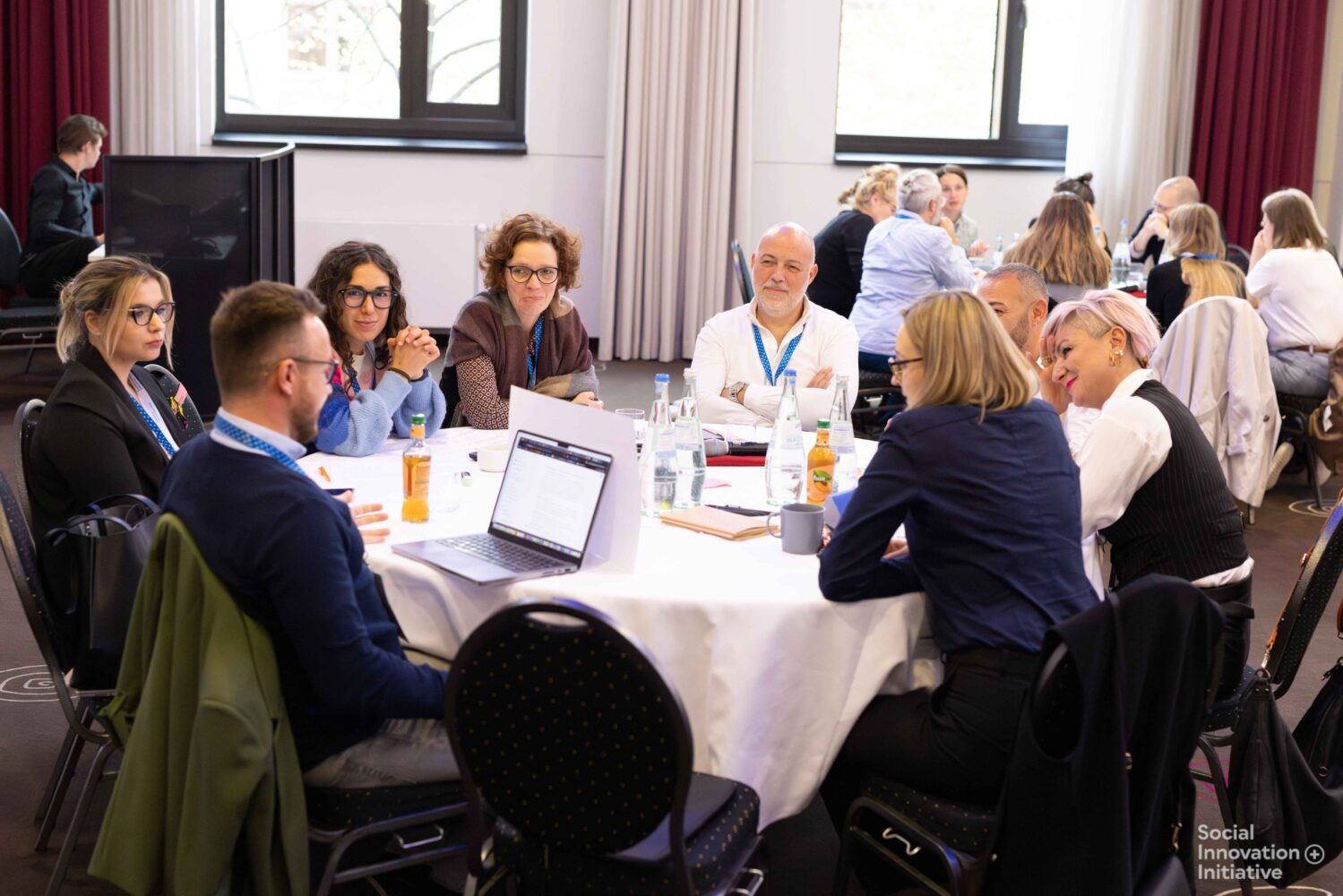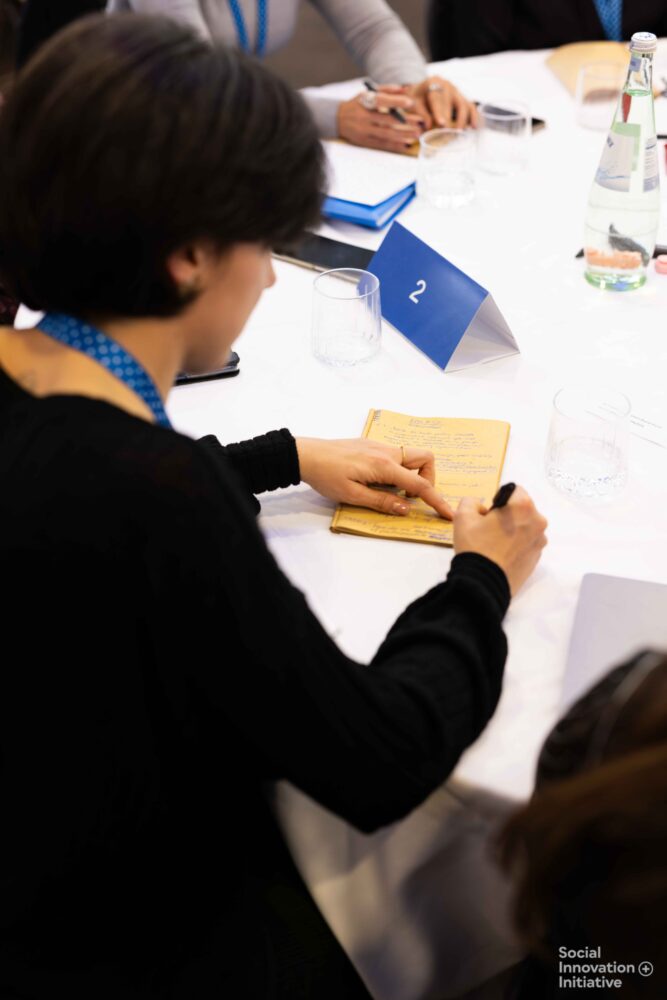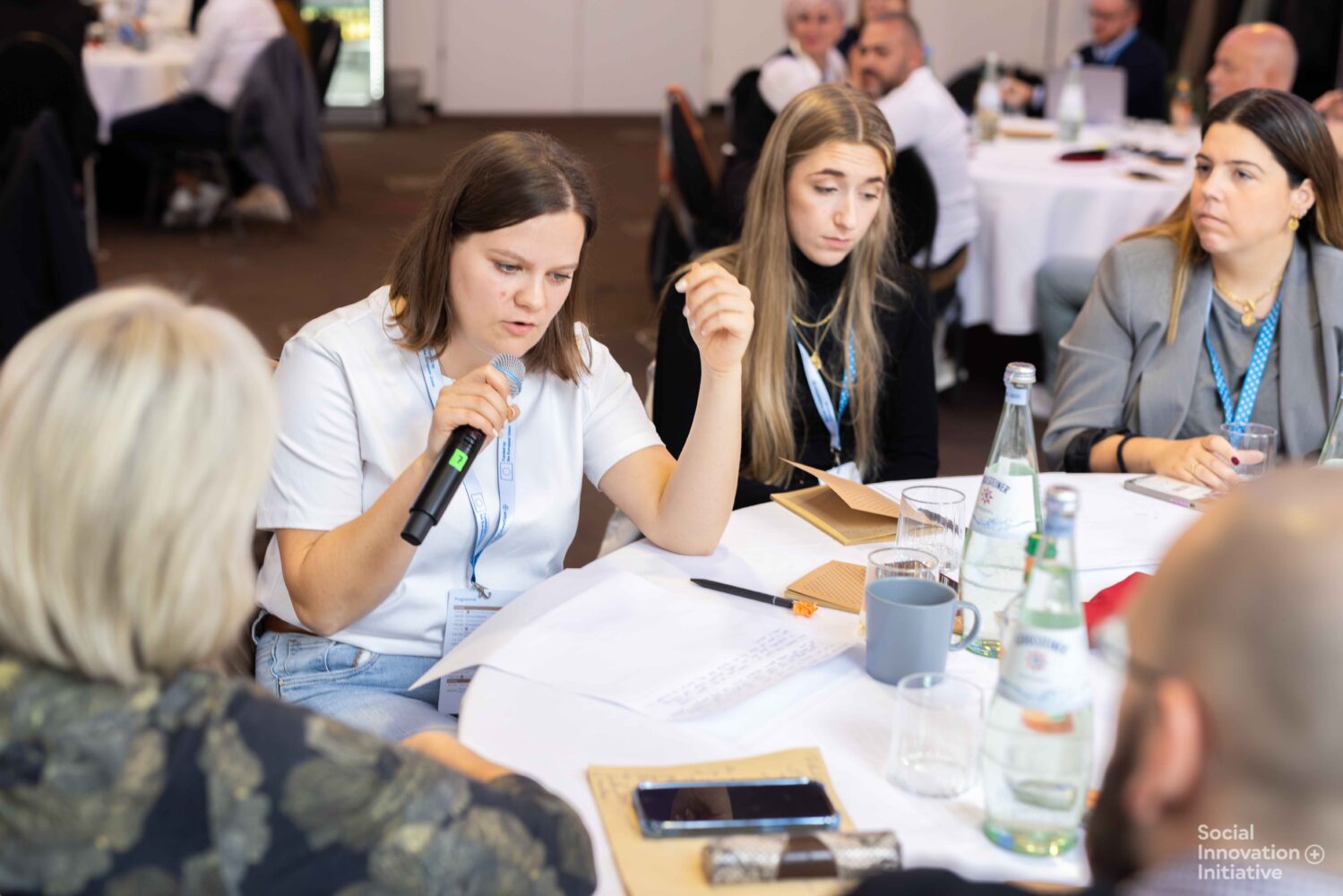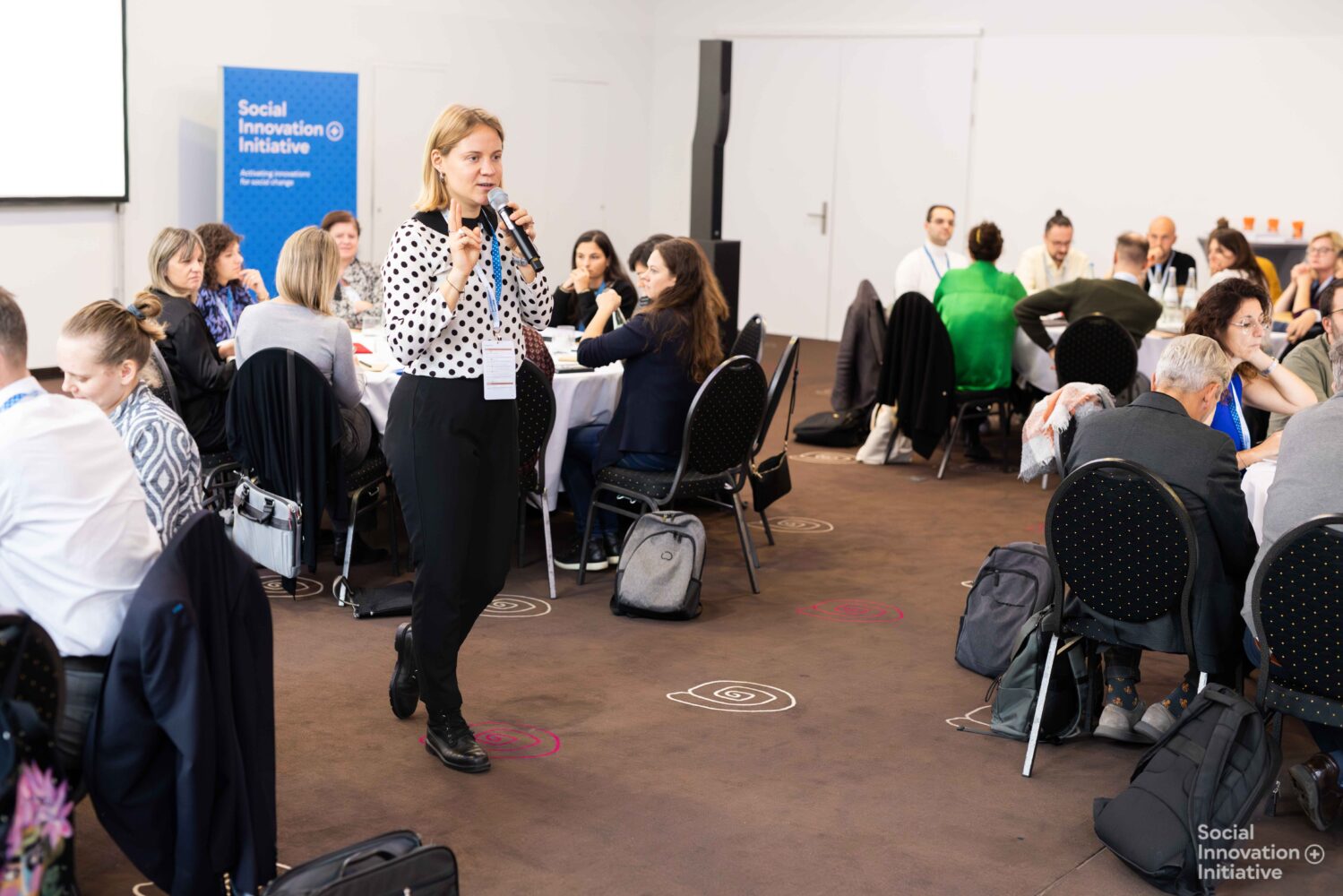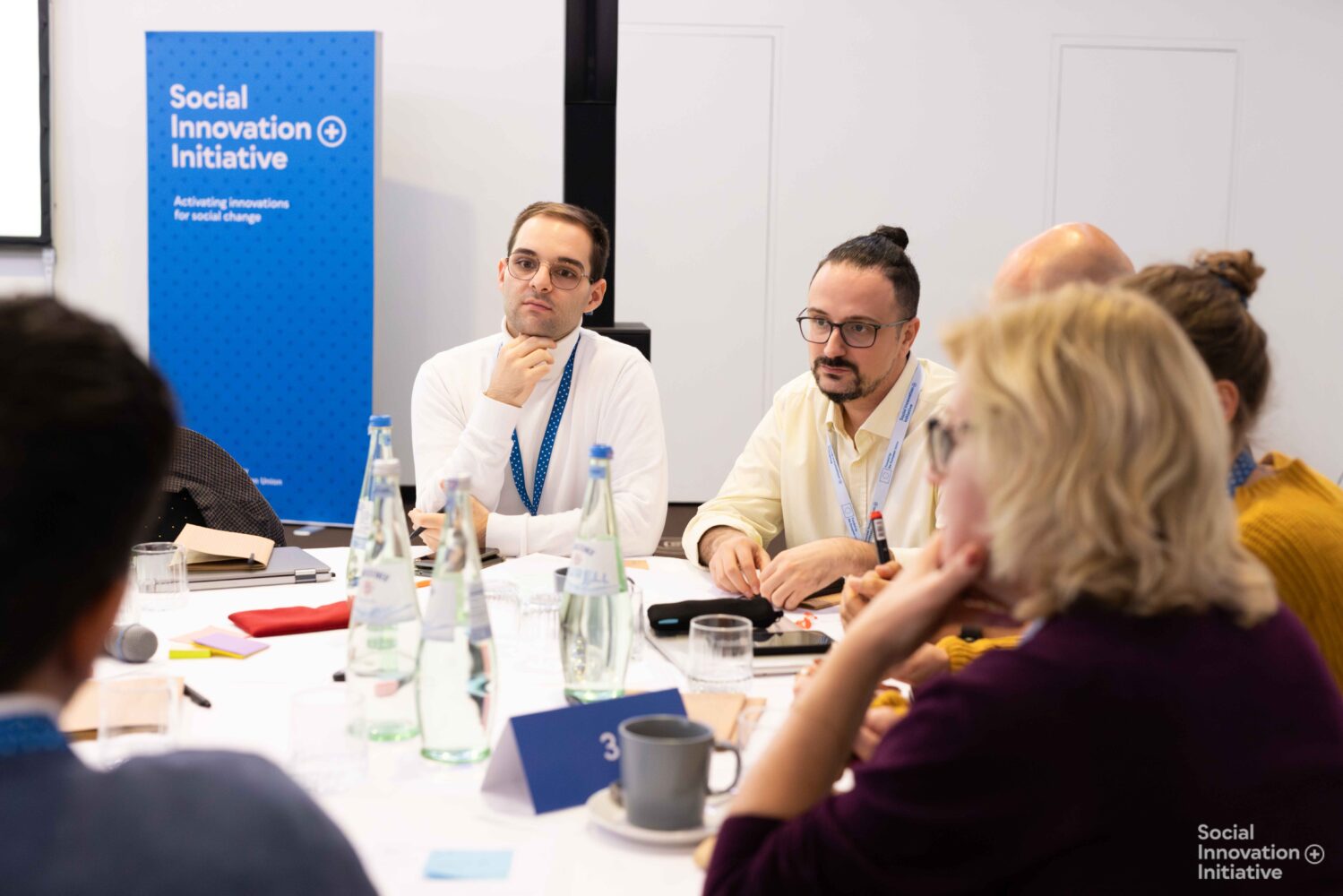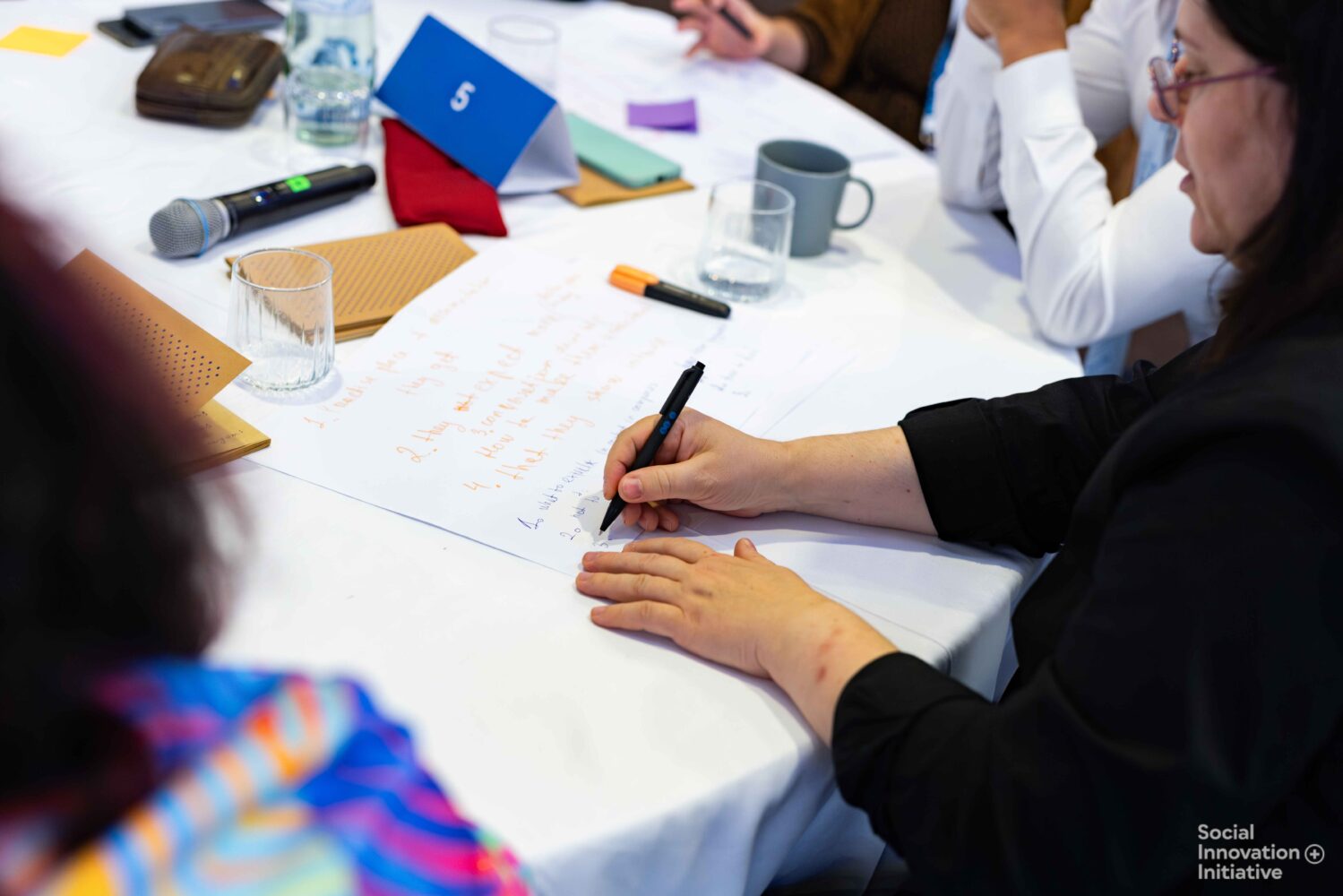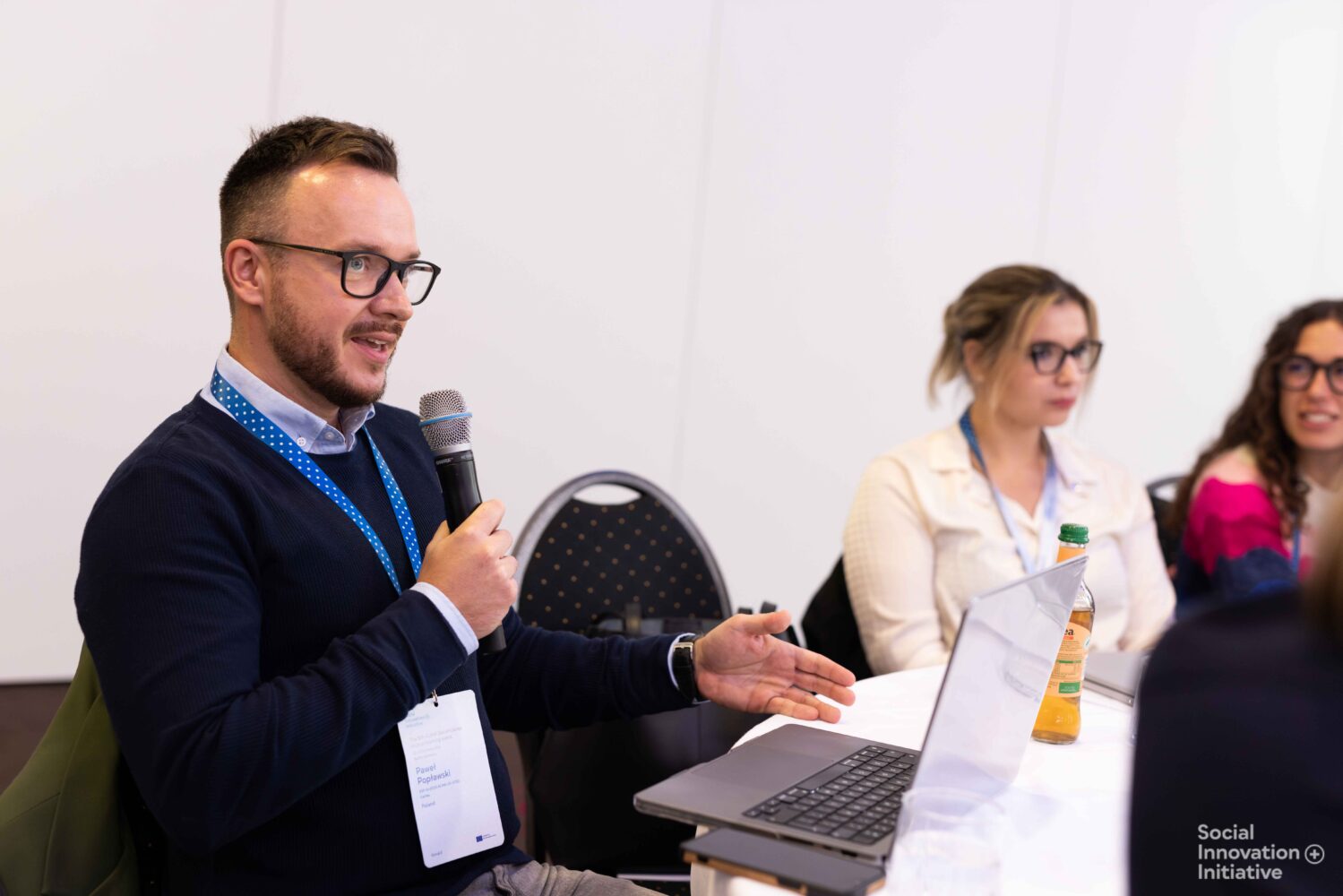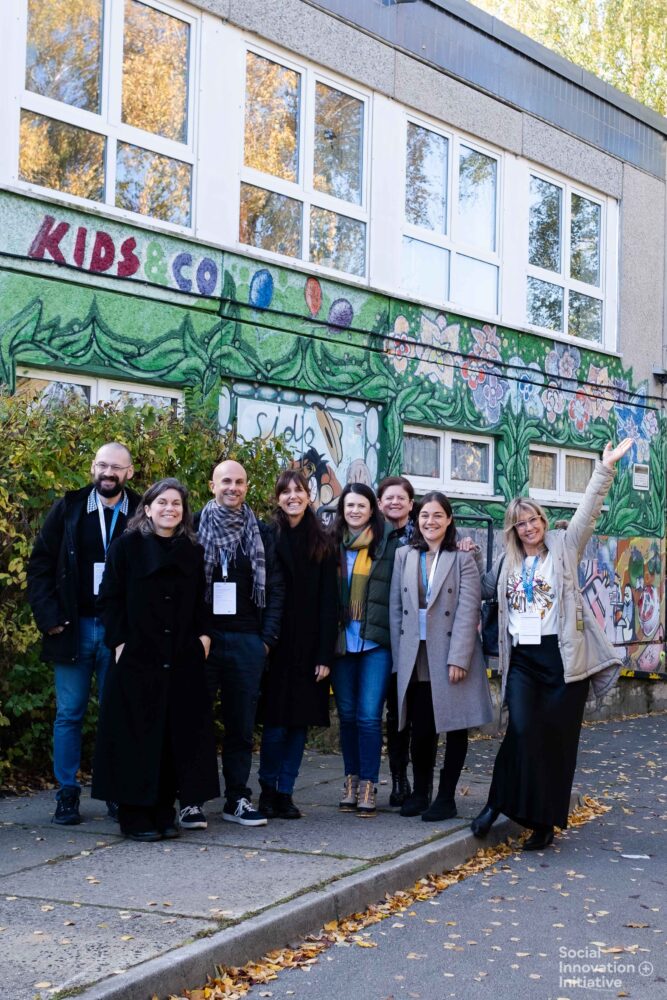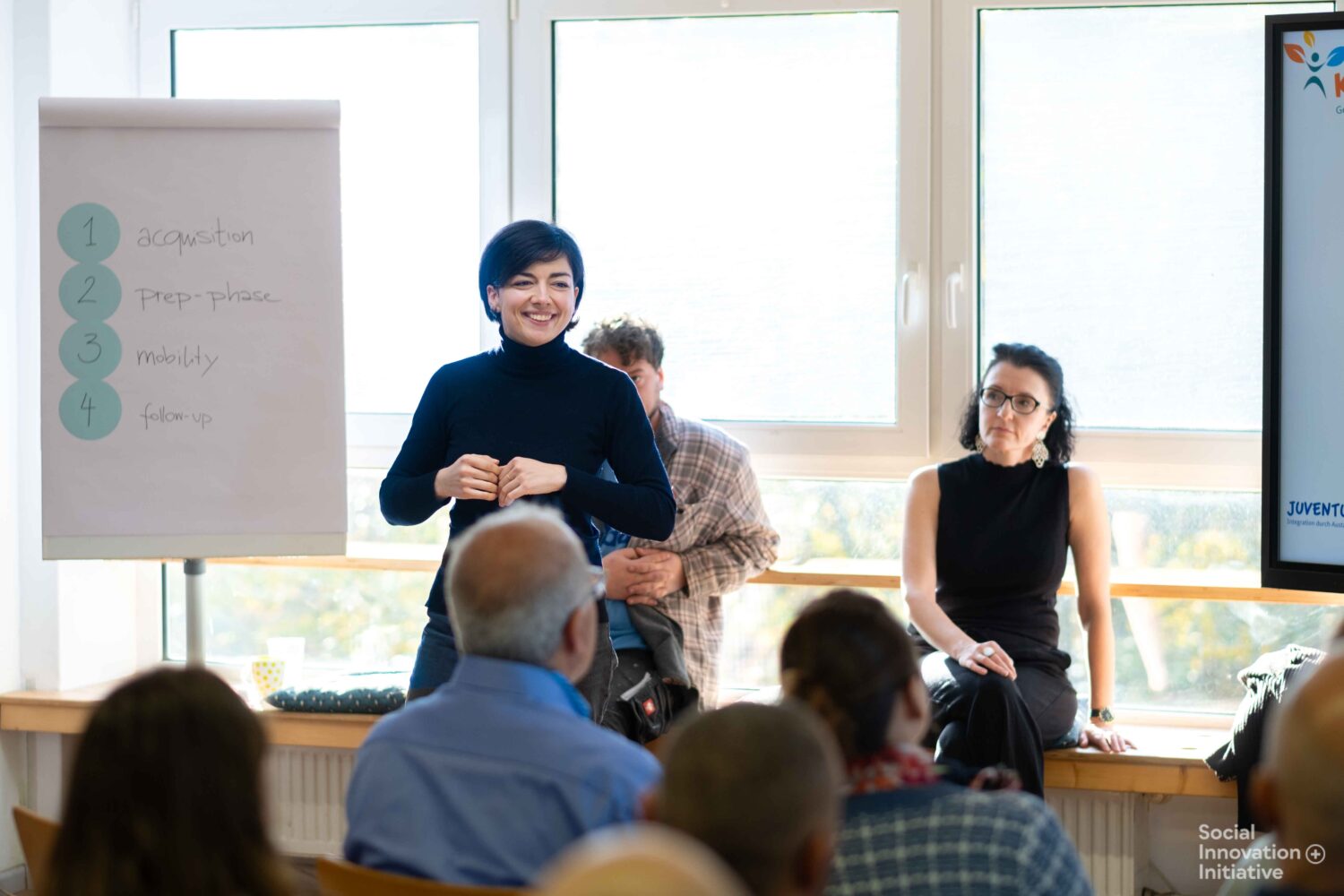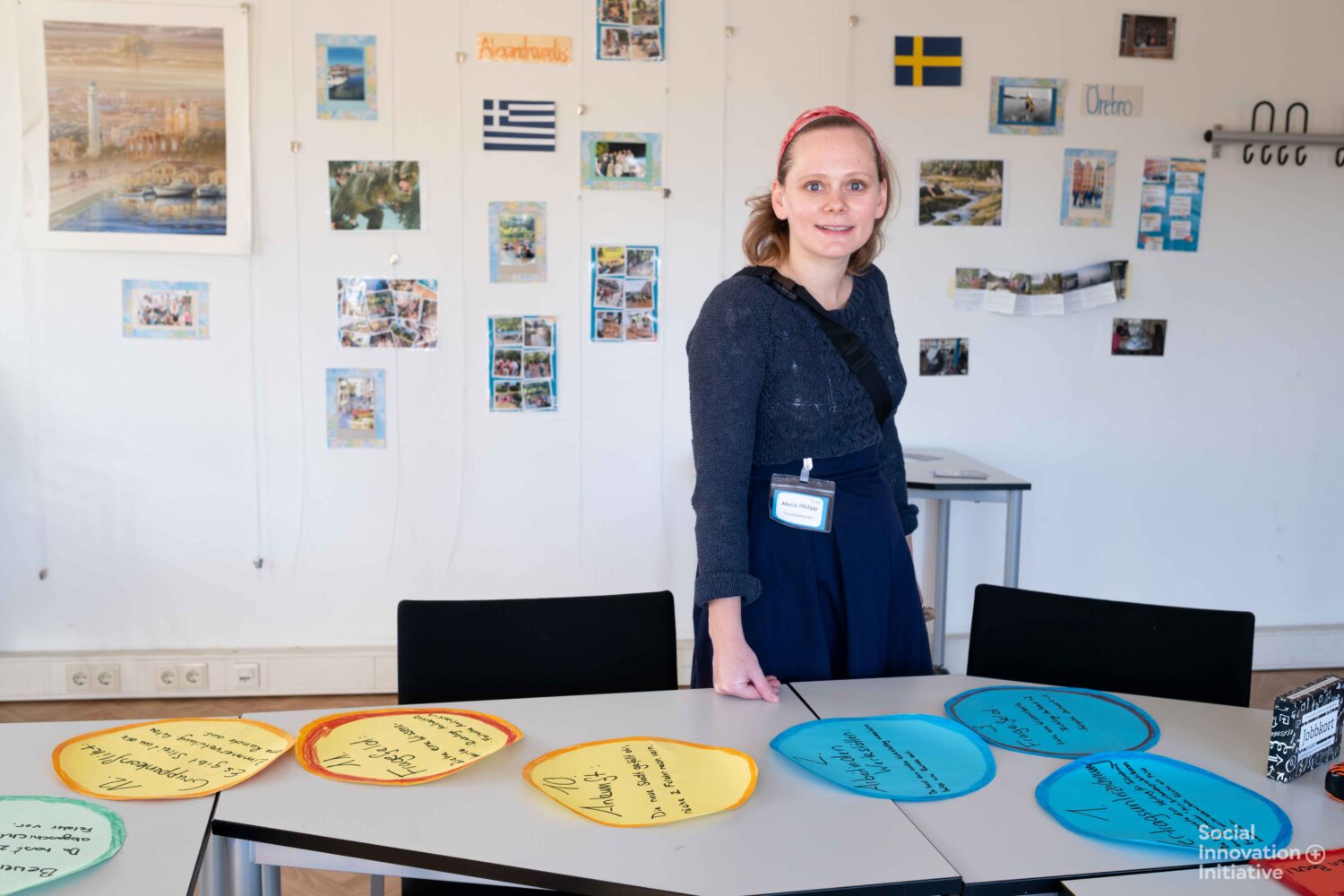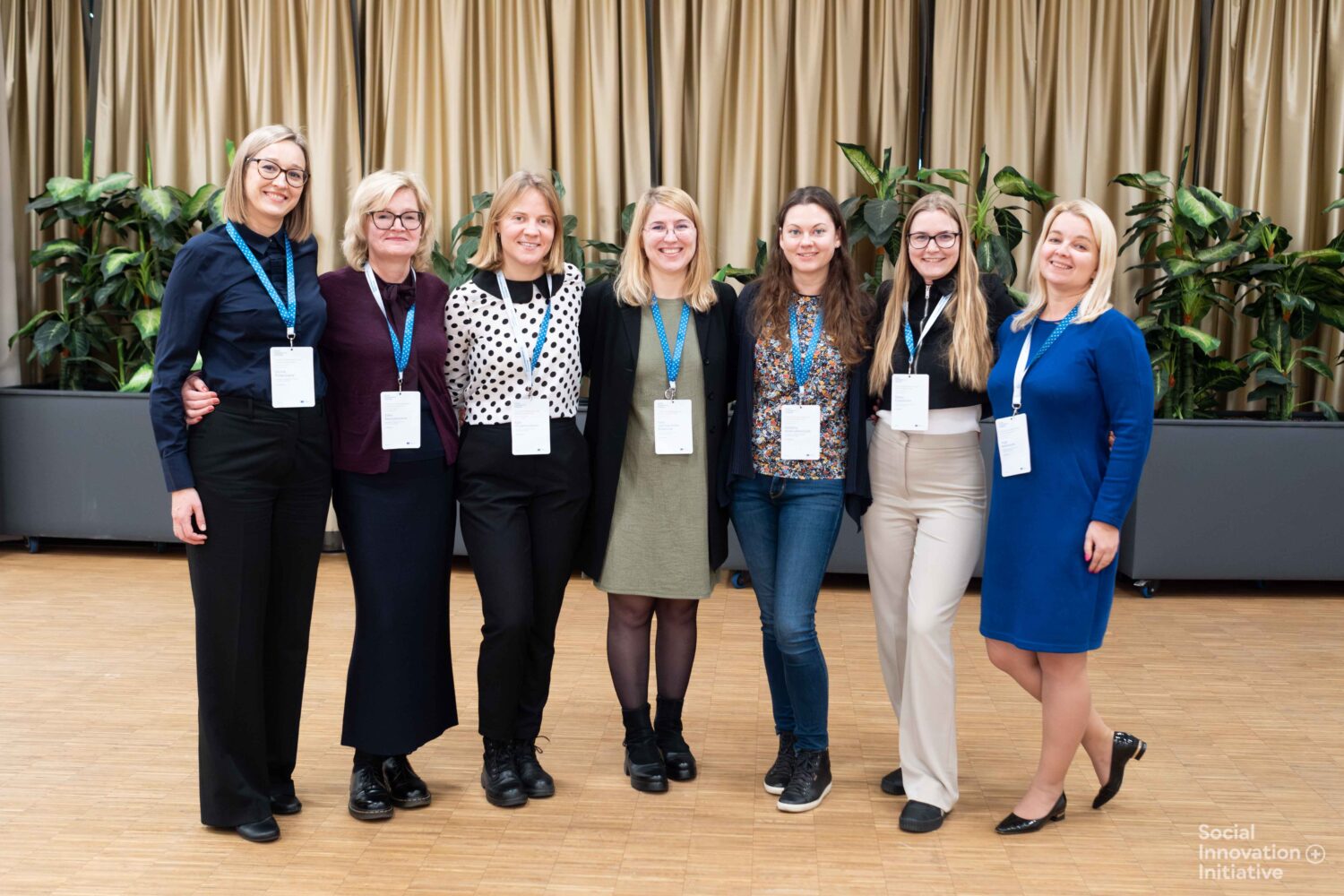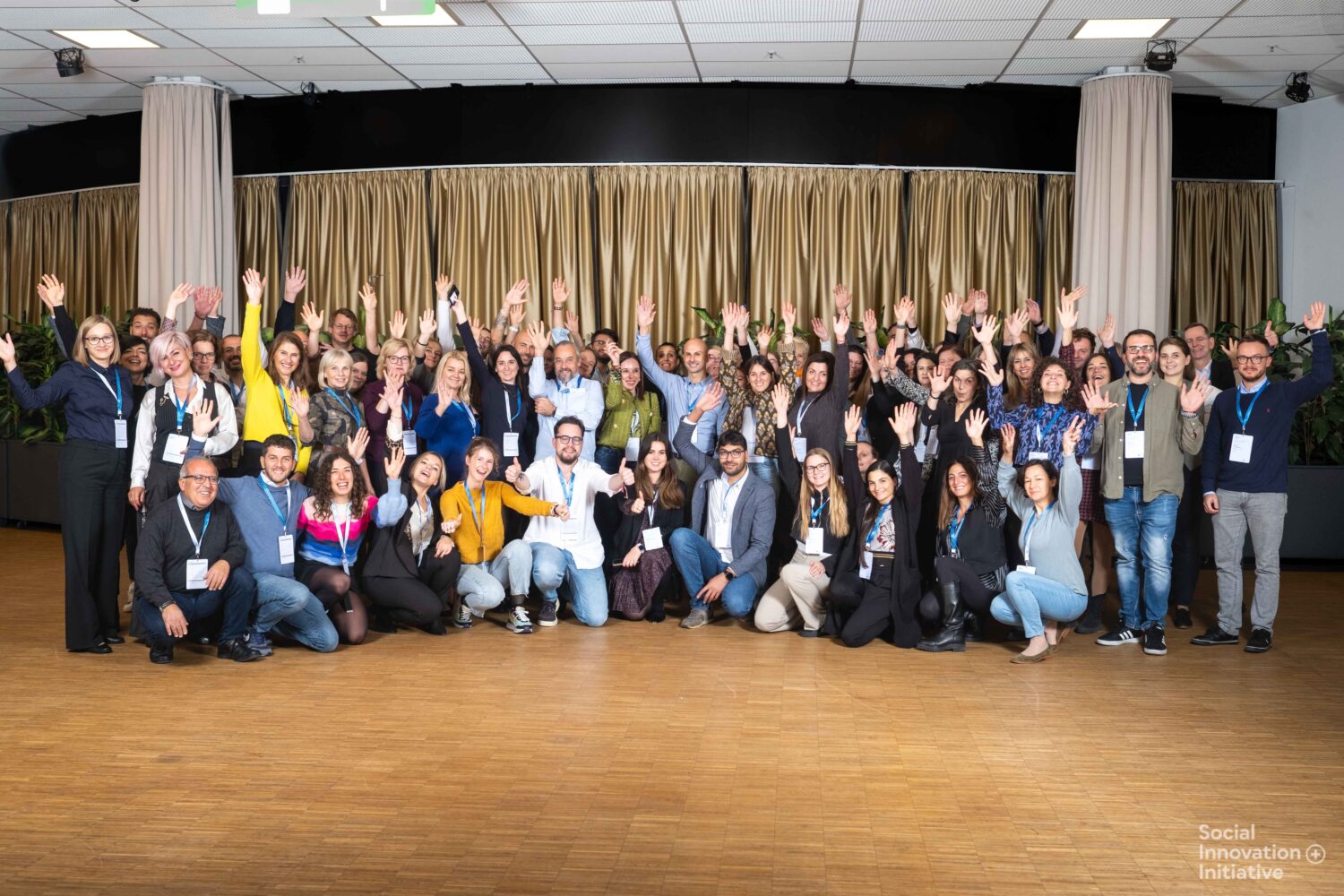Strengthening Collaboration and Knowledge Sharing: Reflections on the 5th ALMA Beneficiaries Meeting in Berlin
On the 22nd and 23rd of October 2024, 70 participants from 11 EU Members States gathered in Berlin, Germany, for the 5th ALMA Beneficiaries Meeting. This event focused on periodic reporting, project communication strategies, and updates on the 29 active ALMA projects. The event encouraged knowledge sharing and collaboration, featuring a Case Clinic – an interactive peer-coaching session designed for direct problem-solving among beneficiaries and experienced German project operators. Additionally, participants benefitted from study visits to two local project organisations, KIDS & Co and WeTeK, and engaged in direct consultations with project coordinators from the European Competence Centre for Social Innovation.
Markus Löbbert, Head of Division EF2 “ESF Programme Implementation, FEAD Managing Authority, Digital Transformation” at the Federal Ministry of Labour and Social Affairs (BMAS) in Berlin, underscored the significance of transnational collaboration in social programmes, drawing upon Germany’s 17 years of experience in this area: ‘Our experience in Germany has shown that the concept of transnational exchange programmes is highly successful. These programmes reach those who are often considered unreachable. This is why, as Germany, we believe it is crucial that this concept is implemented in as many EU Member States as possible. It is an essential element of a social Europe that actively supports disadvantaged youth.’
Marcel Clive Huegel, Policy Officer and Programme Manager for “JUVENTUS: Mobilität stärken – für ein soziales Europa” at BMAS, highlighted the meeting’s critical role in fostering peer learning and knowledge sharing across diverse operational experiences: ‘Such events are highly significant. Although conditions differ from country to country and even between regions, all participants can gain from these meetings. Less experienced individuals can learn from those with greater expertise, while new project operators offer fresh perspectives on various issues. Discussions often lead to valuable insights, and it can be reassuring to recognise that others also face similar challenges.’
Important highlights on Periodic Reporting for ALMA projects
Dovilė Požeckienė, Project coordinator at the European Competence Centre for Social Innovation introduced the participants to the main project management task of the year – the first periodic reporting. This process marks the completion of the first year of project implementation and showcases both the substantive and technical progress of the ALMA projects. She also explained that the successful achievement of planned activities and deliverables would enable the disbursement of a second pre-financing payment, ensuring the continuity of the projects.
The presentation detailed the reporting process, covering what needs to be submitted, when, and how, with a specific focus on declaring expenditure under different funding forms. Additionally, Dovilė Požeckienė emphasised the importance of providing supporting documents or other proof to confirm the achievement of deliverables, as well as ensuring the data aligns with the Beneficiaries’ financial statements.
This session was a vital part of the event, equipping participants with the knowledge and clarity needed for effective project management, reporting and long-term sustainability.
Effective communication and its role in the success of impact projects
One of essential themes addressed during the meeting was the importance of effective communication in ensuring the success and visibility of impact projects. Karolina Andriuškevičiūtė, Communication Expert at the European Competence Centre for Social Innovation, stressed that clear communication not only expresses project goals and outcomes but also builds trust, strengthens collaboration, and promotes transparency.
She explained: ‘Effective communication strengthens the reputation of the implementing organisation, helping to secure wider support and resources. This is essential for achieving long-term success beyond the individual project level.’
The Case Clinic method: addressing challenges and fostering innovative solutions
A defining feature of the 5th ALMA Beneficiaries Meeting was the introduction of the Case Clinic method, a peer-coaching approach designed to tackle specific project challenges and inspire innovative solutions. This method encouraged discussions between participants and experienced German project operators – KIDS & Co, WeTeK, and YOPIC – focusing on practical strategies for managing complex issues in project implementation. Moderated by Eglė Kryžanauskaitė, Project Coordinator at the European Competence Centre for Social Innovation, the session created a platform for dynamic, problem-solving exchanges.
Anna-Maria Aichner, from KIDS & Co, reflected on the aim of the session: ‘By sharing our way of working, we aim to equip participants with the confidence and freedom to experiment with creative ideas.’
During the Case Clinic, each project representative presented a specific organisational challenge, resulting in the discussion of 14 cases in total. Although the individual issues varied, several common themes emerged, including:
- Developing new methods to reach target audiences,
- Sustaining participant involvement beyond the mobility phase, and
- Effectively managing participant dropout rates.
The Case Clinic generated a range of relevant questions, providing a foundation for sharing insights and proposed solutions. Key topics included:
- Engaging stakeholders who are not formal project partners: strategies involved identifying shared objectives, targeting appropriate contacts within organisations, and organising joint events to demonstrate mutual benefits.
- Motivating NEETs (young people not in education, employment, or training) to accept job offers after the project: suggestions included creating clear career paths, forming an Alumni Network to inspire confidence, and offering flexible work hours to align with young people’s needs.
- Building trust in public services among young people: participants highlighted the importance of outreach, ensuring the visibility of supportive services, and increasing youth-friendly communication channels.
In addition to these broad themes, some practical strategies emerged to support project-specific challenges, including:
- Reaching the Target Group: participants suggested using a variety of outreach methods, including organising community events, working with social media influencers, and staying present in places commonly visited by young people. Close collaboration with local organisations and family support was also advised to encourage sustained engagement.
- Maintaining Post-Mobility Commitment: Suggestions for enhancing participant engagement after mobility included organising job fairs, providing step-by-step guidance, introducing peer mentoring programmes, and showcasing success stories from previous participants to demonstrate achievable outcomes.
Participants also discussed additional challenges that arise in various project phases, including:
- Engaging young people in remote or rural areas and helping them access relevant opportunities,
- Maintaining motivation across project stages, particularly for those with complex personal circumstances,
- Managing disparities in project funding rates, which impact programme delivery. For example, project representatives from Poland raised concerns over fixed daily rates, suggesting that mobility rates should reflect the cost of living in the host country to support equal access across Member States.
Strategies for overcoming these challenges included targeting outreach to local influencers and respected community figures, posting notices in high-traffic community areas, and employing social media advertising to increase project visibility. Additionally, personalising engagement efforts to fit the unique needs of each target group was highlighted as essential for motivating participants. Approaches like self-reflection exercises, anonymous feedback opportunities, and positive reinforcement of personal growth were shown to build participant confidence and encourage retention.
The Case Clinic approach provided a collaborative space for brainstorming and collective problem-solving, capturing a diversity of expertise and perspectives. Reflecting on the session, Laura Perucho Garcia from IDEA – Ajuntament d’Alzira, shared: ‘The mutual learning events organised by the European Competence Centre for Social Innovation provide ALMA beneficiaries with the opportunity to share their experiences and practices. They were invaluable not only for gaining new ideas to tackle challenges but also for building partnerships with similar organisations. I am grateful to the project coordinators for their supportive and helpful approach. Meeting them face-to-face allowed us to address many of our questions quickly. I believe these events are essential for increasing engagement with ALMA’s goals and fostering collaborations for future projects focused on the inclusion of vulnerable youth.’
In summary, the Case Clinic method resonates with ALMA’s commitment to fostering a collaborative environment, enabling project leaders to share innovative strategies and practical insights that ultimately strengthen the initiative’s impact across EU Member States.
Key Insights from Study Visits to German Project Operators KIDS & Co and WeTeK
During the 5th ALMA Beneficiaries Meeting in Berlin, participants took part in valuable study visits to the established local project operators, KIDS & Co and WeTeK. These visits, held on the event’s second day, were essential in meeting the event’s objectives by allowing participants to explore new approaches in youth empowerment, vocational training, and employment support. Participants were divided into two groups, each visiting one organisation, allowing for in-depth exploration of their respective methodologies and programmes.
KIDS & Co, a non-profit organisation, has been actively serving Berlin’s Marzahn-Hellersdorf district since 1992. With a mission to support children and young adults, KIDS & Co delivers a range of programmes focused on practical life assistance, educational development, and workforce transition. Their holistic approach combines recreational activities, educational projects, career counselling, and international exchange opportunities. This strategy helps young people build confidence, develop essential skills, and navigate the complexities of personal and professional growth. Through its tailored support, KIDS & Co aims to empower individuals to overcome personal challenges and establish a solid foundation for future success.
Founded in 2007, WeTeK is another prominent non-profit in Berlin, recognised for its pioneering work in youth culture, media, and training. WeTeK’s projects engage a wide range of audiences, including children, teenagers, young adults, and professionals in education, the arts, and vocational training. The organisation places a strong emphasis on expanding employment opportunities and providing cultural and media-rich experiences that bridge the gap between education and the job market. WeTeK’s diverse programming reflects its commitment to enhancing both technical skills and personal growth, preparing young people to thrive in a dynamic employment landscape.
The study visits offered ALMA beneficiaries a platform for direct engagement with local project leaders, sparking dialogue on best practices, potential improvements, and creative approaches to project implementation. These exchanges allowed participants to consider new methods and strategies that could enhance their own projects and initiatives.
Stephan Schellin, a representative of WeTeK, reflected on the visit’s significance: ‘We hope that our concepts for regional and infrastructural programme integration, combined with insights from our project work, have provided valuable suggestions for successful implementation in other locations. We are pleased that the question-and-answer session with one of our former participants, along with detailed insights into the regional labour market, captured the participants’ interest.’
Similarly, Anna-Maria Aichner of KIDS & Co highlighted the enriching exchange: ‘Our team, MAP Europa, was eager to showcase not only our methodologies and values in implementing our programmes but also the potential for the project within the JUVENTUS initiative. The perspectives shared by job centre representatives and former participants, alongside the enthusiastic questions from attendees, enriched the experience. It is a privilege to support our defined target groups in achieving their professional ambitions through the opportunity of an international experience.’
The visits to KIDS & Co and WeTeK provided practical insights into the successes and challenges encountered by these organisations. Attendees observed first-hand examples of innovative approaches to social inclusion, training, and youth empowerment, reinforcing the importance of collaboration between local operators and transnational initiatives such as ALMA. Through such partnerships, organisations can address common challenges and promote sustainable social innovation across Europe, fostering a brighter future for young people in diverse communities.
The insights gained from KIDS & Co and WeTeK will undoubtedly inspire and inform future efforts, contributing to a stronger, more cohesive European social framework.
To conclude, the 5th ALMA Beneficiaries Meeting provided a valuable platform for collaborative learning, knowledge sharing. By focusing on periodic reporting, effective communication, and peer-coaching method, knowledge sharing from the national project operators, study visits, the event empowered participants to tackle challenges more effectively and strengthened the foundation for ongoing success in ALMA projects across Europe.
